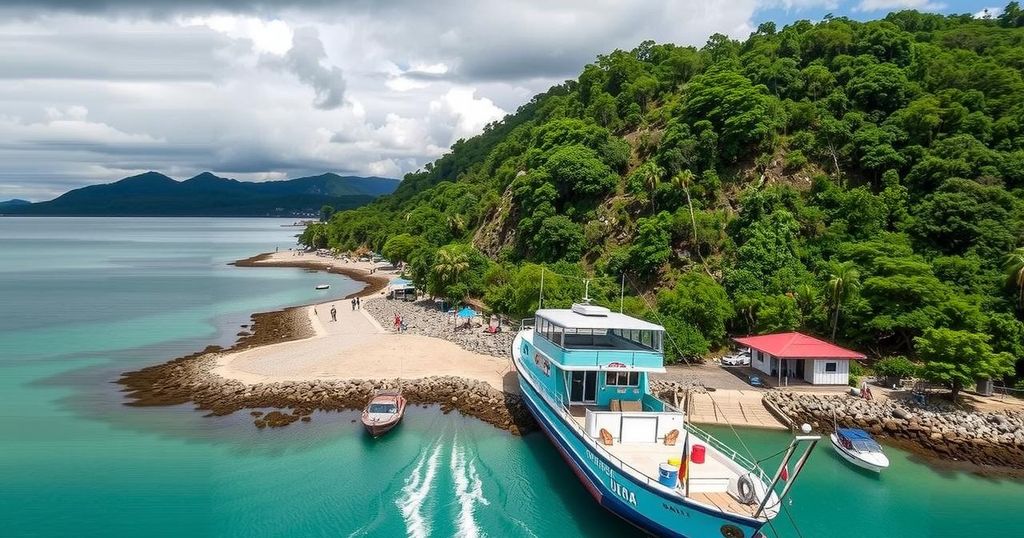The Lobito Corridor seeks to enhance trade between Angola, Zambia, and the DRC, promising economic growth and job creation. However, many Congolese fear it may lead to increased exploitation of their natural resources. Local leaders emphasize the need for a focus on community benefits over foreign interests, reflecting broader concerns about the management of the DRC’s mineral wealth and the potential for neo-colonial outcomes.
The Lobito Corridor, a major infrastructure project linking Angola to the Democratic Republic of the Congo (DRC) and Zambia, has stirred significant debate about its implications for the region. While officials, including U.S. President Joe Biden, advocate for its potential as a regional trade hub, many Congolese express concerns that it could further facilitate the exploitation of their natural resources, particularly given the DRC’s vast mineral wealth.
The Corridor spans 1,300 kilometers (approximately 800 miles) from the Port of Lobito in Angola, through DRC’s mineral-rich provinces, and aims to enhance connectivity for transporting minerals to global markets, particularly for the U.S. and Europe. President Félix Tshisekedi of the DRC has emphasized the expected creation of approximately 30,000 jobs and the potential for economic growth. However, skepticism persists among local populations who worry that the project may not benefit them as intended.
In Kolwezi, a critical area along the railway, residents like Claude Banza see hope in the project, anticipating improved job opportunities. Conversely, others warn it may merely serve external interests, exacerbating local poverty. Dady Saleh, an economist, labeled the initiative “neo-colonialist,” suggesting the Congolese will receive minimal benefits while foreign stakeholders reap the rewards.
Concerns extend beyond economic implications. Civil society leaders argue that without proper regulation, the Lobito Corridor could lead to environmental degradation and social injustices. The DRC’s history with foreign exploitation fuels these fears, as previous resource extraction has left little prosperity for local communities.
While there are promises of enhanced transportation efficiency and reduced logistics costs for raw materials, many local voices highlight the need for infrastructure projects to prioritize local community wealth and industrial development. This paradigm shift, articulated by community leaders, aims to ensure that mineral resources benefit Congolese citizens rather than external entities alone.
The future of the Lobito Corridor remains uncertain, as it symbolizes broader conflicts over resource management, economic empowerment, and geopolitical strategies in Africa. Though it is positioned as a transformative economic opportunity, whether it will deliver tangible benefits to the Congolese people remains a critical question.
The Lobito Corridor is a proposed railway stretching from the Port of Lobito in Angola through Zambia and the Democratic Republic of the Congo, which is rich in critical minerals such as cobalt and copper. The project is designed to connect the Atlantic and Indian oceans, facilitating trade and exporting minerals faster to Western markets. President Joe Biden and other African leaders endorse its potential for economic growth in the region, yet many in the DRC are cautious, fearing it represents a threat to their resources and sovereignty. The DRC possesses the world’s largest cobalt reserves, and its previous experiences with foreign investments have left indigenous populations skeptical about the distribution of benefits from local resources.
The Lobito Corridor presents both opportunities and challenges for the Democratic Republic of the Congo. While officials espouse the potential for economic growth and job creation, the fears of exploitation highlight the complexities surrounding foreign investments in resource-rich nations. Ensuring that the local communities in the DRC benefit from such projects requires critical scrutiny, accountability, and a commitment to prioritizing the interests of the Congolese people over foreign entities. The future of the Corridor will indeed depend on how these negotiations are handled and whether local populations see a shift from mere extraction to sustainable development.
Original Source: www.aljazeera.com






